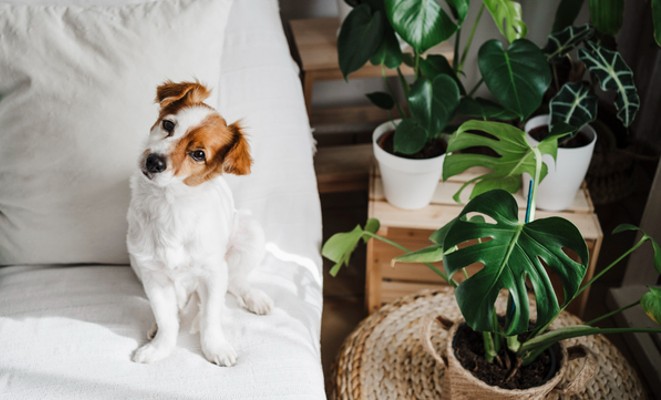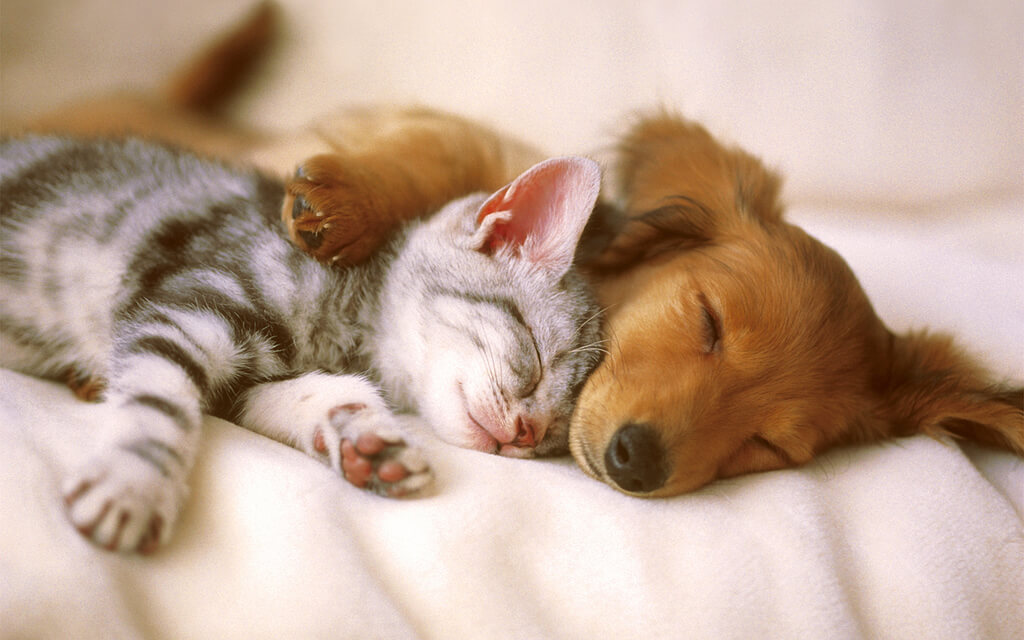Pets and gardens don’t always mix, especially if you’ve got a dog who loves to hide bones under your rose bushes. But it’s not just our pets who can do damage to our plants; unfortunately, it can be the other way around.
There’s an almost overwhelming number of plants in Australia that can be toxic to cats and dogs. Many of them only cause mild to moderate symptoms if ingested, but some can cause severe health problems and can even be fatal. If you’re a pet owner and a green thumb, it’s important to know which plant species to keep your furry friends away from.
Here’s a starting point for how to stop your pets from barking up the wrong tree.
10 common plants which can be toxic to pets
Source: Juliette Steen, 10 common plants that are poisonous to dogs and cats, Australian Broadcasting Corporation.
Azaleas: Steer clear of these pretty blooms; severe azalea poisoning in cats and dogs can result in a coma or even death. As a rule, avoid the rhododendron family altogether if you’re looking for pet-friendly flowers to plant in your garden.
Cannabis: Unfortunately, vets see instances of cannabis poisoning far too often; it’s one of the most common plant-related poisonings in pets. Dogs and cats should be kept away from the plant, as well as from any loose matter or products containing tetrahydrocannabinol (THC).
Ivy: With a name like Devil’s ivy, at least this one’s easy to remember. Many ivy plants, including English ivy, can be toxic to pets. Ivy plants are popular in homes and gardens around Australia, so keep a watchful eye out.
Lantana: Lantana is highly toxic to cats and dogs. In Australia, it’s generally considered a weed, which fortunately means you’re not likely to accidentally bring it home from the flower shop. Be mindful in rural areas—especially if you’re bushwalking with your dog or letting them off the leash in areas where lantana might be growing wild.
Lilies: Cat owners beware: poisoning from lilies can be fatal to felines, even with early intervention and treatment from a vet. The calla lily, peace lily, Easter lily and tiger lily are all toxic to cats, but it’s probably best to avoid having any lilies in your home at all. Lilies are popular in bouquets and as presents, so be wary of gifted flowers. If you suspect your cat has ingested even a small amount of a lily, take your cat to your local vet or an animal emergency hospital immediately.
Sago palms: All parts of sago palms (or cycads) are extremely toxic to dogs, and consumption is often fatal. Even just a single seed can cause harm, so it’s best to keep your home and garden free of sago palms. If you’re worried about sago palms outside of your home, they’re typically found in tropical or ornamental gardens. If you suspect your dog has eaten from a sago palm, visit your local vet or an animal emergency hospital immediately.
Philodendrons: Plants from the philodendron family, like the fiddle-leaf philodendron and the Swiss cheese plant, can be toxic to both dogs and cats. Avoid having them in your home or garden for a safer environment for your pets.
Rubber tree plants: Not all rubber tree plant varietals are toxic to cats and dogs, but the Japanese, Indian and Chinese rubber tree plants are. If you’re unsure, err on the side of caution.
Tulip: All parts of a tulip, but especially the bulb, can be toxic to cats and dogs.
Yew: Mild to moderate yew poisoning can have adverse health consequences for cats and dogs, and extreme yew poisoning can be fatal.
Unfortunately, there are many more plants which can be harmful to your pets. Speak to your local vet or RSPCA for more information and advice.
Common symptoms of poisoning in dogs
Dog owners who are worried about exposure to toxic plants should be on the lookout for:
- Diarrhoea
- Drooling
- Lethargy
- Nausea
- Vomiting
- Weakness.
In more severe cases, your dog might also experience:
- Coma
- Extreme sedation
- Seizures.
Common symptoms of poisoning in cats
For cats, common symptoms of exposure to toxic plants include:
- Diarrhoea
- Difficulty breathing
- Dilated pupils
- Drooling
- Excessive drinking and urination
- Increased or rapid heart rate
- Inflammation around the mouth
- Panting
- Vomiting.
What to do if your pet eats a toxic plant
If you suspect your cat or dog has eaten a plant which can be toxic to pets, or if they are exhibiting any of the symptoms listed above, call your local vet or an animal emergency hospital. Do not induce vomiting, as this can exacerbate the problem.
In cases of cats and lilies or dogs and sago palms, immediately take your pet to receive medical attention.
When visiting the vet, bring a sample or a photo of the suspected plant for verification.
Keeping your pets safe
The best way to keep your pets safe from plants which can be toxic to them is to ensure your home and garden are free of any poisonous plant species. This can be a challenge due to the number of plant species known to be toxic to cats and dogs. Consider landscaping options which limit your pets’ access to the garden, such as fenced-off areas or raised garden beds. Early training for your pet is always a good idea, too.
It can be scary to think about your pet coming into contact with toxic plants, but remember: it is absolutely possible to have healthy pets and thriving gardens. Stay educated, stay vigilant, and keep loving your furry friends.


